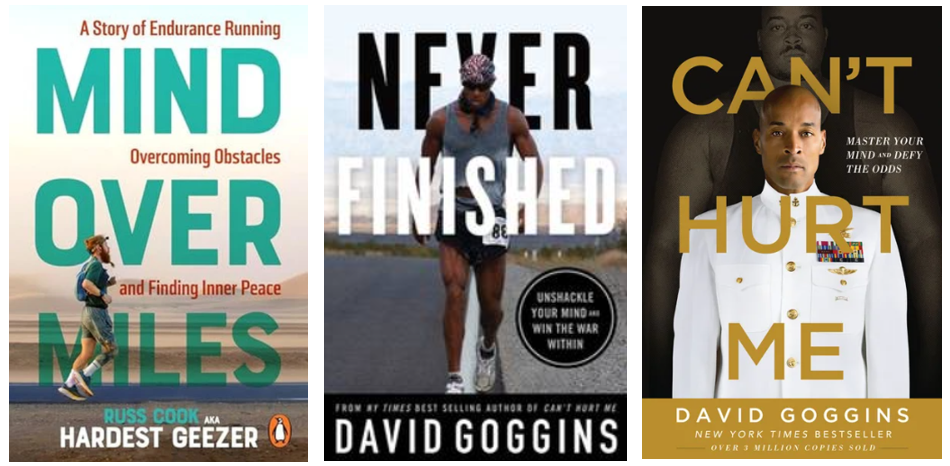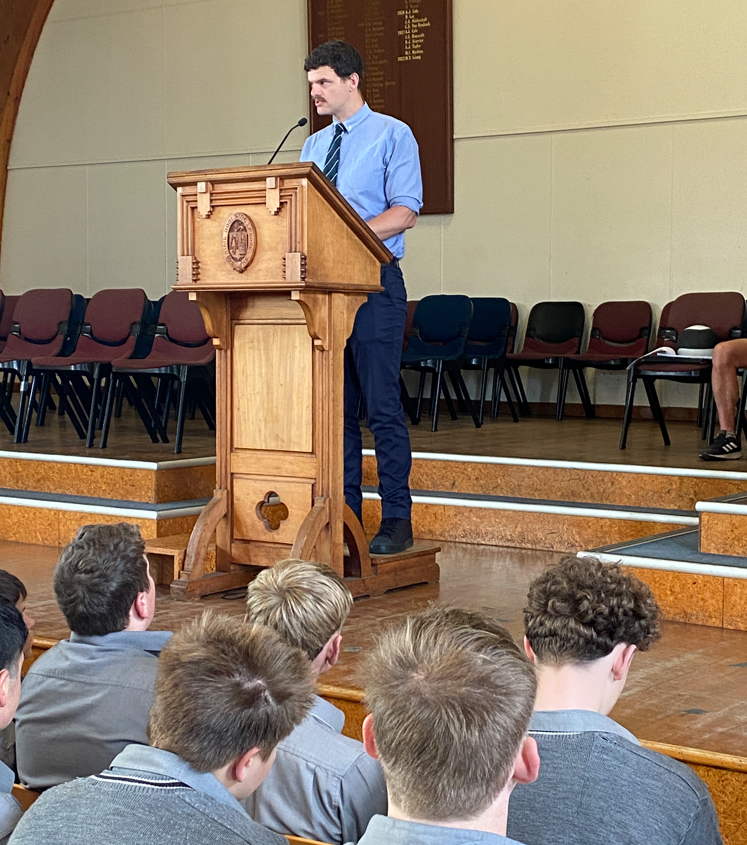Thank you to Mr Macdonald, who presented this week's book review in assembly this morning. Mr Macdonald spoke about the lessons from three popular books in the PNBHS Library - 'Can't Hurt Me' and 'Never Finished' written by David Goggins, and 'Mind Over Miles' written by Russell Cook.
“With the Junior Road Race ahead, the experienced and eager runners will be focused on speed, finishing times, or PBs. Those guys are sorted and squared away. But I want this book review to be heard by the majority in the hall — the reluctant runners, the battlers and the strugglers. I want you to think about what happens inside your head when things get tough — because that’s when your growth really begins.
There are two men whose stories I want you to learn from: David Goggins, author of Can’t Hurt Me and Never Finished, and Russ Cook, author of Mind Over Miles. Both show us what happens when you push past comfort, challenge yourself, build mental strength, and refuse to settle for the easy way out.
Lesson 1: Comfort kills potential
David Goggins’s first book, Can’t Hurt Me, details how he grew up with real hardship — health issues, an abusive father, bullying, feeling weak. But he didn’t let that define him or become an excuse. Instead, he says: “I was in danger of living a life so comfortable and soft that I was on track to die without ever realising my true potential.” Whenever he felt down, angry or upset, he’d sulk with a chocolate milkshake – because it made him feel better. It made him feel comfortable. Until he realised that at nearly 135kg, living life as a cockroach killer, that comforting chocolate milkshake was literally killing him.
Think about that. If you choose easy, safe, comfortable, you may never get close to what you’re capable of. Reuben Love stood here a month ago and gave the same message. Put yourself in tough situations if you want any chance of furthering yourself. Goggins calls it callousing the mind — making your brain tough, to deal with tough situations, in the same way your hands get tougher doing hard work.
That’s exactly what Mr Love has shown through his actions and his message to us: to see potential, you must step into discomfort. The comfort of chocolate milkshakes did not make Goggins who he is today.
Lesson 2: Effort counts more than talent
Goggins' second book, Never Finished, teaches us that success isn’t about how naturally gifted you are — it’s about how hard you’re willing to work, especially after getting knocked down. Life, school, running — none of it rewards entitlement. No one cares how cool you are. He writes that you must earn every step, every outcome. Your mind will try to trick you into thinking you deserve more than you put in, but we know this is not the case. You will get your comeuppance – you will get what you deserve.
In life, there will always be people who are fitter, faster, stronger or smarter. What counts is your effort, your consistency, and your refusal to quit when things get hard. Talent is capped, but it is also only the starting line; effort takes you to the finish and beyond.
Lesson 3: The mind decides how far you go
Russell Cook, author of “Mind over Miles” ran the full length of Africa — 16,000 km, over 352 days, through deserts, jungles, and war zones. He was robbed at gunpoint in Angola, abducted and held for ransom while running in the DRC, and ran head-on into sandstorms in the Sahara. He shows that your body will carry you far, but if your mind quits first, you stop. Cook says, “Growth is found on the other side of “hard.” The hardest step, he says, is simply getting out the door when you don’t feel like it. If you want something different — a faster time, a stronger finish, or pride you carry forever — you have to do the hard work when it’s not fun. He documents his thoughts, feelings and daily interactions with the people me meets on his running and life-changing journey.
So, when you line up for the Junior Road Race:
Your mind will want to quit before your legs do. That “I’ll just slow down or stop” moment is where you need to start the fight. The real work may be the last 1,500 m for some, or the first 15 steps for others. The run isn’t just about finishing — it’s about becoming the person who finishes. Perhaps that’s a better version of yesterday’s self.
Consider this year’s MOAB 240: 240 miles long, climbing and descending more than 9,600m vertical — higher than Everest, in temperatures from 0°C to 40°C through the Utah Desert. Over 250 of the world’s best runners sign up every year. Goggins has competed three times and Cook has it firmly at the top of his bucket list. Only a handful hope to win. The rest sign up for growth. You don’t need to be fastest or smartest — you need to be your own hardest competitor. Let the discomfort of training, studying, or racing build you. Let the pain teach you. Let the struggle change you.
Conclusion:
What Goggins and Cook teach us is simple: discomfort and effort are the paths to growth. The mind decides the race, the journey, and who you become. Every challenge — whether it’s a 5 km run, a 16,000 km adventure, a 48hr challenge, a sports team trial, exam or test — every challenge is a chance to push past your limits, to learn your strength, and to become better than who you were yesterday. All three books put this into perspective. They are all in our library. They were in hot demand by the seniors, but should now be back on the shelves.”

